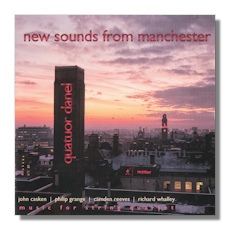
The Internet's Premier Classical Music Source
Related Links
- Latest Reviews
- More Reviews
-
By Composer
-
Collections
DVD & Blu-ray
Books
Concert Reviews
Articles/Interviews
Software
Audio
Search Amazon
Recommended Links
Site News
 CD Review
CD Review
New Sounds From Manchester

- Camden Reeves:
- Fireworks Physonect Siphonophore (String Quartet #1)
- Dactylozooid Complex (String Quartet #2)
- Richard Whalley: Interlocking Melodies
- John Casken: Choses en moi
- Philip Grange: Ghosts Of Great Violence
Danel Quartet
Métier MSV28546 60:44
Manchester is an industrial city in the north west of England with a reputation for grime and lack of sun that is only half deserved. The subject of novels by Dickens, Brontë and Mrs Gaskell, its prominence in the arts is not always recognised. But in terms of music, such pre-eminence is undisputed. The the so-called "Manchester School" from the 1950s can boast major composers including Harrison Birtwistle, Peter Maxwell Davies, Alexander Goehr and David Ellis. Now here's an enthralling CD of chamber music played in lively and thoughtful fashion by the Quatuor Danel – Marc Danel and Gilles Millet, violins; Vlad Bogdanas, viola and Guy Danel, cello.
Founded in 1991, the Quartet has always privileged contemporary music – often pairing performances and/or recordings with the classic cycles of Haydn, Beethoven, Schubert and Shostakovich. They succeeded the Lindsays as Quartet-in-Residence at Manchester University in 2005, significantly broadening the repertoire to which audiences in the city were routinely exposed. This proved successful; new compositions by composers there resulted. This CD exemplifies this virtual explosion of new (chamber) music in Manchester. It was recorded in February and December 2013 at the Cosmo Rodewald Concert Hall in the University of Manchester – actually a somewhat spacious, almost "showy" acoustic which does not stint from placing the music front and center, perhaps even withdrawing some of the intimacy which one might expect from the string quartet.
In fact, such an extrovert presentation says much about the contemporary genre. Both Camden Reeves' (b.1974) String Quartet Number 1 (Fireworks Physonect Siphonophore) [tr.1] and Richard Whalley's (also b. 1974) Interlocking Melodies [tr.2] and vibrant, pushy, taut and bold-sounding works where perhaps energy and momentum subvert immediately-evident musical construction. Each of the composers, in their own ways, is in a hurry. The Quatuor Danel is never swept away by the pressing, semi-angular – though far from raucous or callous – energy of the music. Rather, they open it up, as one might safely pin an assailant's arms back!
Similarly the three-movement Second String Quartet, Dactylozooid Complex, [tr.s 3,4,5] is full of excursions – not wild, but certainly not mild. And the players respect the idiom, which is rich in contrasts… Reeves is fond of very subdued, almost silent passages like that with which the third movement of the String Quartet #2 ends [tr.5].
John Casken's (b.1949) Choses en moi quotes from and relates to earlier work of this Professor of Music at Manchester from 1992 to 2008 and alludes, of course, to Prokofiev's Choses en soi. Again contrast between force and song is a feature of the music. It's never really overtly lyrical; but some unison writing and a sense of the pastoral, almost, are never far from the otherwise semi-mechanical drive. Such energy seems to suit these musicians so well.
Philip Grange's (b.1949) Ghosts Of Great Violence [tr.s 7,8,9,10] is perhaps the subtlest and least immediately yielding of the five works on this hour-long collection. None of the works is strictly atonal or serial. This one comes closest to swallowing us in "pure" music. This may actually communicate more than appears at first: it's a reaction to the composer's visits to battlefield sites of the Somme from the First World War. The suggestion is thus that chaos and firestorm, mass slaughter and a complete inability to explain the madness of aggression create their own vortex which is pure because so hard to grasp.
Ghosts Of Great Violence is the most substantial of the works here, in four contrasting movements lasting half an hour. The players really work at building, then developing, the musical ideas. The same is true for the other works, although each has some sort of program… Reeves' are actually biological, Whalley's a tribute to Ligeti. But it's in this delicate, poignant, yet equally angry string writing that the intensity of all the music presented here is most evident. It also perhaps best typifies the approach taken by the Danels of not allowing rhetoric or indeed agitation to detract from the care needed to project chamber music like this to an attentive audience. It's an approach that works well, and will prove satisfying to listener's new to the music of these composers as well as those familiar with their predecessors like Birtwistle and Maxwell Davies, whose music – it has to be said – is far more adventurous.
This is a CD to gladden the heart. The music was written, and is played here, without apology. It's what quartets by composers routed in a vibrant local tradition in the twentieth and twenty-first centuries sound like. Although it's not easy to imagine any of the works here forming parts of the same established and inevitable cycles as from the great chamber music composers, this is interesting music – if all a little similar-sounding. Yet it's the confidence and unapologetic nature of what is being written in the city where it's joked that the sun is an unidentified flying object which distinguishes the playing of the Quatuor Danel. They never feel the need to advocate or represent. They simply play the music as written. But they do so with style, technical acuity and just the right amount of interpretative color.
Copyright © 2015, Mark Sealey





















